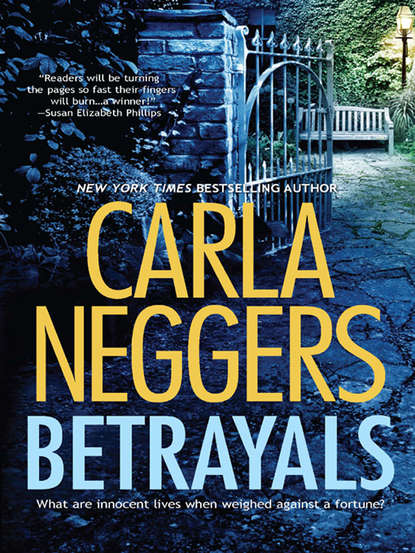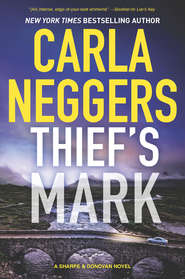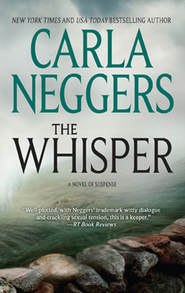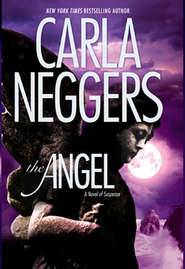По всем вопросам обращайтесь на: info@litportal.ru
(©) 2003-2024.
✖
Betrayals
Автор
Год написания книги
2018
Настройки чтения
Размер шрифта
Высота строк
Поля
As if he had any choice. “Of course, Mother.”
“I was going to come into the office,” she said, leading him out of the garden house, “but I felt this is a private matter properly discussed at home.”
Quentin made no comment at her assumption that he, too, would consider the Winston house his home. She gestured to the chair at the white iron table he’d occupied since boyhood, and he sat down obediently, letting her pour two glasses of fresh-squeezed, lightly sweetened lemonade. There was the ubiquitous plate of sugar cookies as well, their sweet smell mixing with the scents of the garden, an unusually large one for Beacon Hill.
His mother withdrew a folded section of newspaper from the khaki jacket she always wore gardening. “I saw this at the pharmacy earlier this morning and decided I should call you.”
She shook the paper open as she handed it across to him, her hand steady, and Quentin tried to conceal his reaction when he saw the two photographs occupying most of the front page of the popular national tabloid. He could feel himself going pale, could feel his stomach begin to burn. The picture on the left was a famous shot portraying the final American withdrawal from South Vietnam. It was seared in Quentin’s mind for all time. There, again, was twenty-year-old Rebecca Blackburn carrying an infant and supporting the weight of a seriously wounded Jared Sloan as she got them all into a helicopter, only hours before communist troops entered Saigon. Rebecca’s anguished expression—of shock, horror, betrayal, grief and determination—had captured the mixed feelings of so many as the nation of South Vietnam ceased to exist, and two decades of American hopes and promises ended.
The photograph on the right was a recent one of Jared Sloan in San Francisco, decking a motorcycle tough who’d insulted his fourteen-year-old Amerasian daughter, looking on from her grandfather’s limousine. Quentin’s gaze lingered on Mai Sloan. He absorbed every detail of her pretty face with its unusual, distinctive features. He could see Tam in her.
Tam…
After so many years, Quentin was amazed that he still felt betrayed by her, still felt such unrelenting sorrow over how they’d lost each other. She’d died that last day in Saigon. Her child—Jared’s child—had lived. “It’s painful to look at, I know,” Annette said tartly, snatching the clipping from him. “How Jared could let such a thing happen…” She broke off with an irritated sigh. “There’s not much of an article. Fortunately, we weren’t specifically mentioned, but they did find out Rebecca Blackburn’s back in Boston. I’m afraid there could be ramifications for us, Quentin. We should be prepared.”
“Mother, don’t be silly. I haven’t seen Jared in years—”
“That doesn’t matter. He’s your cousin. And if the press should learn Winston & Reed had hired Rebecca—and let her go—we could be in for some nasty publicity.”
Quentin doubted his mother would ever let him forget that he’d inadvertently allowed a Blackburn to come under contract with their company. It was the sort of oversight Annette Winston Reed would never make. He said awkwardly, “You know I took care of that problem in as discreet a manner as I could.”
She scowled. “There shouldn’t have been a problem to take care of.”
“Mother,” he said gently, knowing that trying to defend himself would only make matters worse, “I’m confident I can handle the media should anyone want to pursue this story, but frankly, I doubt anyone will. What would be the point? The Blackburn-Winston thing’s been exhausted twice, in 1963 and again in 1975.”
Annette stiffened, annoyed. “Don’t patronize me, Quentin. Your cousin should have considered us when he decided to attack that fellow.”
“I doubt Jared’s even thought about us in years.”
“I’m sure you’re right about that,” she said bitterly. “Nevertheless, you’ll remain alert, won’t you?”
“Of course.”
“And stay away from Rebecca Blackburn. She’ll only cause trouble.”
“Mother, she’s as much a victim in all this as you or I—”
“A Blackburn a victim?” Annette fell back into her chair with a derisive laugh. “Now who’s being silly?”
Regretting his unthinking comment, Quentin slipped into silence. Once he’d finished his obligatory glass of lemonade and sugar cookie, his mother allowed him to leave, with further promises that he’d do whatever he could to keep her, himself, and Winston & Reed out of the newspapers. He walked back out to Beacon Street, crossing onto the Common and stopping at the Park Street subway station. The vendor there had plenty of copies of The Score. Quentin bought one for himself.
His walk slowed and he felt a little faint, almost sick, as he stared again at fourteen-year-old Mai Sloan. He’d never even met her. He wished circumstances had allowed him to know his cousin’s daughter. Tam’s only child. But that would have meant breaching the unspoken agreement between his mother, Jared and himself. Jared’s illegitimate half-Vietnamese daughter was his concern. In the unforgiving mind of Annette Winston Reed, Mai was an embarrassment to suffer, not a member of the family. To disagree with that summation would have required more courage than Quentin could muster.
And for his part, Jared seemed content with his exile from Boston, from the Winstons and the world he’d known as a child. There were times Quentin envied his cousin his freedom.
He looked again at the photograph, at Mai’s beautiful almond eyes and her father’s livid face, and he sadly realized there was no one he’d risk injury and the notoriety of his picture in The Score to defend. He wondered if Jared regretted the outburst that had landed him on the cover of a supermarket tabloid, but thought not. Jared had always been one to act on impulse, but he willingly accepted the consequences for whatever he did. Quentin had always admired his cousin’s courage, his ability not to look back.
He threw the tabloid in a trash can and crossed over to Tremont Street, trying to blame the tears in his eyes on the wind. “Oh, Tam,” he said, his voice choked, and flagged a cab, wanting suddenly to get back to work and immerse himself in the present. His mother was right about that: thinking about the past and rehashing it—alone, with friends, or on the pages of a gossip tabloid—would only bring them all more pain and anguish.
Best simply to forget, he told himself, yet already knowing he never would.
Annette pinched off a yellow geranium leaf and crumpled it in her hand, amazed at how stupefyingly dull her life had become. She seemed to be paying for her days of adventure and excitement with a proper late middle age. She’d always thought she’d die before she resorted to potting geraniums. And she was only sixty. Life was unmerciful.
Throwing down the leaf, she smoothed the tabloid front page on her worktable and allowed her gaze to linger on Mai Sloan. She was a pretty girl—talented, smart and mischievous, the brief article had said. She took clay and gymnastics classes, had lots of friends at the San Francisco public high school she attended. Annette’s older sister, Martha, had tried to interest her in the child when she was just a baby, showing off cute pictures and telling stories, but Annette had let her know she wasn’t about to forget the shame Martha’s son had brought onto the family. She’d had to be quite brutal about it. Like most people who found themselves pushed up against Annette’s will, Martha had chosen to retreat. Annette remembered her sister’s last words on the subject: “How can you blame an innocent child?”
“I don’t,” Annette had replied. “I blame her father, and since he’s chosen to raise the child—well, he can suffer the consequences.”
Now she and Martha exchanged polite letters between Boston and Nova Scotia. There was no mention of Jared or his daughter, no pictures, no grandmother’s bragging. Mai might never have been born, and that suited Annette just fine. She missed her older sister; she wasn’t afraid to admit it. But their estrangement was a price she was willing to pay to preserve the honor and respect she and Quentin had earned in Boston—and their peace.
Yet Jared’s child didn’t look like anyone’s shame. Her nephew must be a good father, Annette thought, surprised at the rush of relief she felt. Perhaps all had turned out for the best. Quentin wasn’t overly bothered by this most recent flurry of publicity; that was good.
But poor Tam, Annette thought. Still, if she’d lived, would Mai be better off? Would any of them?
Annette sniffed. Why all this second-guessing? What was done was done.
She refolded the clipping and tucked it back into her pocket, then forced herself to put her gardening gloves back on and return to her planting. She wished she had grandchildren. If Quentin would end this ridiculous limbo with his wife and get on with starting a family, perhaps she wouldn’t feel so restless, so unsettled about the future. Perhaps she ought to have Jane to tea and use her influence to encourage a reconciliation.
Annette smiled, imagining how nice it would be to have children playing in the Mt. Vernon Street garden again. She could take them to her mas on the Riviera, show them the olive and lemon trees, let them pick wildflowers in the fields. Yes, life could be enjoyable again, if in different ways than it had been thirty years ago.
She had been acting silly, she decided. There was nothing to worry about. Jean-Paul Gerard could no longer hurt her or anyone she loved. He was dead.
She’d killed him herself fourteen years ago in the hell that had become Saigon.
Five
Jean-Paul Gerard had found the small redwood-and-stucco house on Russian Hill with no trouble, and he stayed out on the steep sidewalk, enjoying the perfect San Francisco day. It was a beautiful city. He’d flown in yesterday after discovering The Score discarded on a bus and had checked out the lay of the land before coming up to Jared Sloan’s today. He’d slept in Golden Gate Park and had eaten cold dim sum for breakfast; he could feel it churning in his stomach now as he waited for Mai Sloan.
According to his rough estimate, she should be heading back from school in just a few minutes.
A mite of a girl came around the corner and skipped down the hill, swinging her book pack. Jean-Paul felt his mouth go dry at the sight of her shining hair, at her energy. She was so like Tam.
When she saw him, her pace slowed, and he knew she was debating crossing the street. He’d had that effect on people for many years, but couldn’t get used to it. Even in the seediest areas of Honolulu, he drew nervous stares from strangers. He was fifty-four years old and could have passed for eighty with his pure white hair and his weather-beaten skin, deeply lined from years of exposure to disease, parasites, bad food, sleepless nights, alcohol and the worst—the very worst—in humankind. A livid welt of a scar ran from under his right eye down his cheek, then jutted left under his chin and finally trailed off down his neck. He didn’t have a lot to live for, and people could tell, with just one glance.
“Mai?” His voice cracked, and he tried to sound less threatening, less scary than he looked. Not daring to step toward her, he went on quickly, “I knew your father in Vietnam.”
Her dark eyes lit up with interest. “You did?”
“And your mother.”
That drew her closer, her book pack dragging on the sidewalk behind her. “I’ve never met anyone besides my father who knew my mother. What’s your name?”
“Is Jared home?”
“Yes—he works out back. Come on, I’ll show you.”
Excited now, the girl pushed open a five-foot wooden gate and led him along a stone walk, flanked with lush greenery, onto a deck. Across a postage-stamp yard was a small shed that obviously had been converted into a studio; a window box overflowed with motley petunias.
“Dad,” Mai yelled over the deck rail, slinging down her pack, “we’ve got company!”











